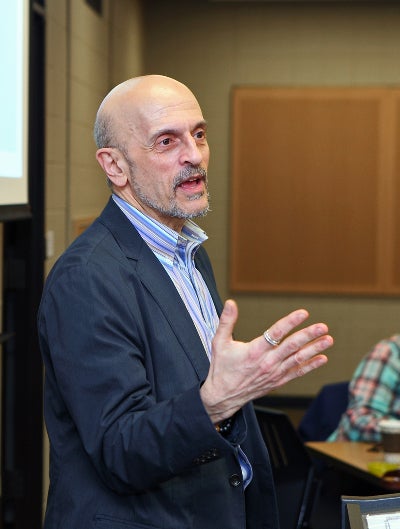2017 Silver Circle Award Winner: Joseph Zanoni
Since 1966, the Silver Circle Award has been presented to some of UIC’s best teachers. Winners, who are honored at their college commencements, receive $500 and their names join a long list of distinguished colleagues. But what makes the award especially meaningful is its selection committee: the graduating seniors. UIC's 2017 honorees includes Joseph Zanoni, PhD, research assistant professor of environmental and occupational health sciences and faculty in the undergraduate public health programs.
I am so thrilled when our students succeed in their careers after they leave our class and I can see that they have taken all the elements, or tools, and have applied them to solve problems.
Story text Heading link

Joseph Zanoni has been teaching for more than 30 years.
He started out as an early childhood special education teacher but found his way to public health through becoming involved in grassroots efforts around the AIDS epidemic in the 1980s.
Now, Zanoni leads training and research projects at the Illinois Occupational and Environmental Health and Safety Education and Research Center, where he works with personal and home care aides, their unions and employers to ensure the health and safety of these workers on the job.
Zanoni co-teaches “Using the Public Health Toolbox,” a course aimed at seniors enrolled in the undergraduate public health degree course in the School of Public Health. The course culminates in a practice-based project.
“It’s not research,” said Zanoni, director of continuing education and outreach for the Illinois Occupational and Environmental Health and Safety Education and Research Center. “They learn while doing.”
Small groups of students in the class partner with local community organizations to tackle a particular issue. One group created a video of interviews with temporary workers from the Chicago Workers Collaborative talking about problems with precarious work to be shown to elected officials involved in drafting legislation that impacts these workers.
“These participatory projects integrate everything the students have learned throughout their studies,” Zanoni said.
“Health literacy, epidemiology, population health, community outreach, all in one project.”
Zanoni wants to instill in his students the ability to think critically, and to understand what is feasible and practical when it comes to public health.
“These field experiences expose the students to the real world and support the development of the skills they will need as either public health workers, or for continuing their education as graduate students,” he said.